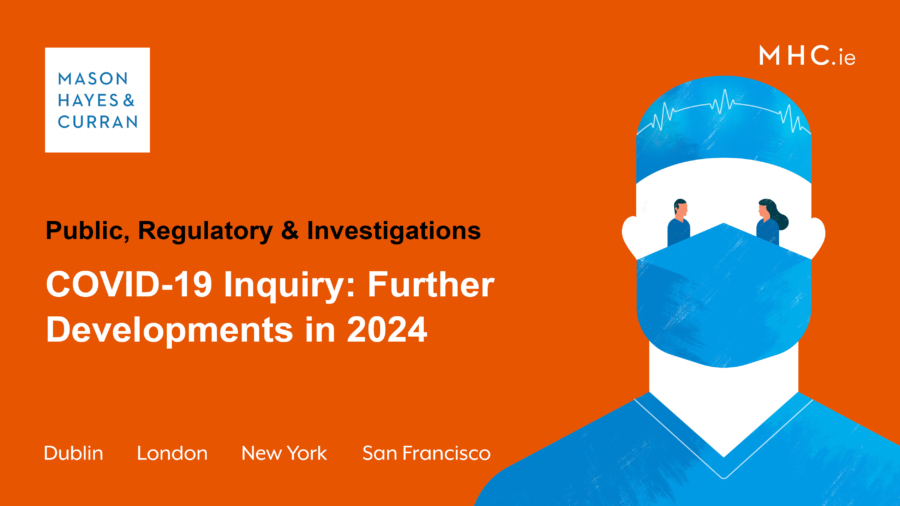COVID-19 Inquiry: Further Developments in 2024
Three top tips for healthcare organisations

Progress has been made on plans for a public inquiry into the handling of the COVID-19 pandemic, as draft Terms of Reference have been presented to Cabinet by the Minister for Health. Catherine Allen, Head of Public Regulatory & Investigations, examines recent updates on the progress of the inquiry and provides her top three tips for hospitals and nursing homes likely to be affected by the inquiry.
We recently discussed in our article Inquiry of State’s Handling of COVID-19 Pandemic that an inquiry will be established by the Irish Government to investigate the handling of the pandemic in healthcare settings such as hospitals and nursing homes. Further updates indicate that the inquiry is likely to be “no-blame” and non-statutory in nature. Although the draft Terms of Reference have been circulated to Cabinet, they have not yet been published. However, it is expected that there will be a particular focus on nursing homes and hospitals. The inquiry is also expected to last 12 to 18 months.
What can we expect the inquiry to look like?
The Terms of Reference for the inquiry are due to be made available to the public shortly and all indications are that it will take the form of a non-statutory inquiry. A non-statutory inquiry is an inquiry that a Minister commissions into a matter of public importance. Unlike a statutory inquiry, or tribunal of inquiry, a non-statutory inquiry is not established by legislation. The main difference between statutory and non-statutory inquiries is that the former benefits from certain legal powers to compel the production of documents and examine witnesses. Non-statutory inquiries rely on voluntary co-operation.
It is expected that the focus will be on long-term residential care facilities for older people, with an independent panel expected to make recommendations on how to strengthen pandemic decision-making. It is important for healthcare organisations that fall within scope to consider their potential obligations to the inquiry early in the process. To assist with this, we have outlined below our top three tips to consider.
Our three top tips for healthcare organisations
Healthcare organisations likely to be affected should start preparing as early as possible and bear the following in mind:
1. Immunities and privileges
A non-statutory inquiry does not entitle you to the same immunities and privileges as a witness before a court or a statutory inquiry. This means you are not entitled to “immunity from suit” and, accordingly, careful consideration should be given to any evidence or documentation that is put before a non-statutory inquiry.
2. Document management and preservation
Preserve any documents that may be seen as relevant to the inquiry and ensure that documents of importance are not inadvertently shredded/discarded. Any documents that you believe are likely to be relevant should be organised and reviewed to ensure that you are familiar with the contents of the documents and the potential for disclosure.
3. Watch out for legal implications around disclosure
Liaise with your data protection officer about documents that you are considering disclosing. Healthcare documents contain personal and sensitive data so it will be important to consider any potential legal implications of disclosure well in advance.
Conclusion
The terms of reference are still awaited. As matters stand, opposition parties have three weeks to comment and make proposals on the terms of reference before they are finalised.
By taking the pro-active steps outlined above, healthcare organisations can ensure that they are adequately prepared for the upcoming COVID-19 Inquiry.
Our experienced and dedicated Public, Regulatory and Investigations team has extensive experience advising in this area and is happy to assist and provide you with valuable legal advice on any issues that may arise.
The content of this article is provided for information purposes only and does not constitute legal or other advice.
People also ask
What is a non-statutory inquiry? |
A non-statutory inquiry involves a Minister commissioning an inquiry that is not based in legislation into a matter of public importance. |
Have any previous non-statutory inquiries taken place? |
Yes, two of the more recent non-statutory inquiries include:
|
How long will the COVID-19 Inquiry last? |
While it is not possible to predict the precise timeframe for the inquiry, the Government expects that the inquiry will last between 12-18 months. |
What is the difference between a statutory and non-statutory inquiry? |
A statutory inquiry is established in legislation and benefits from powers to compel the production of documents and the examination of witnesses. A non-statutory inquiry relies on voluntary cooperation. Non-statutory inquiries tend to be more cost efficient. They also tend to take less time to complete. |
Share this:

Catherine Allen
Partner, Head of Public, Regulatory and Investigations
+353 86 382 1009 callen@mhc.ie

